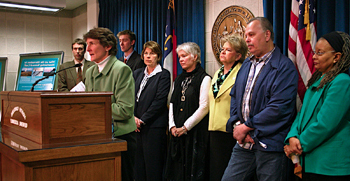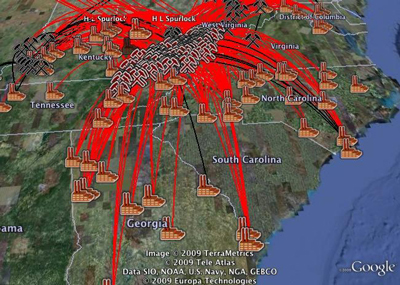States aim to end mountaintop removal
 Mountaintop removal coal mining is responsible for the burial of almost 2,000 miles of Appalachian streams, the leveling of over 500 Appalachian mountaintops, and the ecological devastation of over 800 square miles of one of the most bio-diverse regions of our planet.
Mountaintop removal coal mining is responsible for the burial of almost 2,000 miles of Appalachian streams, the leveling of over 500 Appalachian mountaintops, and the ecological devastation of over 800 square miles of one of the most bio-diverse regions of our planet.
But in most states where mountaintop removal coal is used to generate electricity, the actual mining is not taking place. The connection between flipping on a light switch and the blasting of one of the world’s oldest mountains is not one many consumers make.
In 2009, citizens and legislators in several states are trying to change that. In unprecedented moves, the top 2 consumers of mountaintop removal coal (Georgia and North Carolina) introduced bills banning the use mountaintop removal mined coal in their states. But they are not the only ones. Here is the list, so far… 😉

STATE CONNECTIONS – This map shows some of the connections between coal-fired power plants and the mountaintop removal mines that supply them with coal. To see a map of the states who are taking action, download this Google Earth file.
States taking action
Georgia
Kentucky
Maine
Maryland
Missouri
North Carolina
Pennsylvania
South Carolina
Tennessee
Washington DC
West Virginia
To get a bill introduced in your state, contact Kate Rooth at Appalachian Voices.
North Carolina – The Appalachian Mountains Preservation Act
 The Appalachian Mountains Preservation Act (AMPA) was first introduced in the North Carolina House in the 2007/2008 session by Representative Pricey Harrison, and would phase out state electrical utilities’ contracts for mountaintop removal coal.
The Appalachian Mountains Preservation Act (AMPA) was first introduced in the North Carolina House in the 2007/2008 session by Representative Pricey Harrison, and would phase out state electrical utilities’ contracts for mountaintop removal coal.
AMPA came back in the 2009/2010 session with serious momentum; not only did Ms. Harrison introduce the bill at a well-attended press conference in the North Carolina House, State Senator Steve Goss introduced a companion bill in the North Carolina Senate (S 341). The bills currently have 31 cosponsors in the House and 4 in the Senate. There is a Lobby Week in support of AMPA planned for April 27-29th, 2009.
North Carolina has taken the lead, and continues to work towards a clean energy future in the South. We’ve modernized almost every aspect of our lives, but we still use coal to power our Blackberries and laptops.
This bill helps us move away from the very worst kind of coal mining. It will save taxpayers money in the long run, and it is simply the right thing to do.
– – – North Carolina State House Representative Pricey Harrison
I am firmly convinced that mountaintop removal is a moral issue that begs our hearts and minds to do the right thing.
I believe this bill shows people in North Carolina and the nation that we are serious about our environment and the future world that we will leave to our children and grandchildren. When this bill becomes law, once again we will take our place as a leader in the nation concerning environmental issues.
– – – North Carolina State Senator Steve Goss
With AMPA, North Carolina has the opportunity to maintain its status as a leader in creating and passing legislation that places the lives, health and safety of its citizens, as well as those of Appalachia, above the desires of coal companies and corporate interests. It would build on the momentum that has already begun; North Carolinians, especially, have made significant progress:
- North Carolina’s Salem Presbytery was the first to pass a resolution in opposition to mountaintop removal – a resolution that was carried to the Presbyterian Church (U.S.A.) and passed in 2006.
- In 2002, North Carolina passed The Clean Smokestacks Act, which mandated the implementation of modern pollution control devices at North Carolina’s coal-fired power plants. The Act was among the strongest air pollution control measures in the country at the time; thanks in part to the Clean Smokestacks Act, North Carolina’s Attorney General was able to win a lawsuit against the Tennessee Valley Authority for allowing harmful air pollution in to our fair state.
Update
Seventy-five North Carolina state legislators have signed on to a bipartisan letter asking for an end to mountaintop removal coal mining. The letter, co-authored by Senator Steve Goss (D- Ashe, Alexander, Watauga, Wilkes), Representative Pricey Harrison (D- Guilford), and Representative Ruth Samuelson (R- Mecklenburg), is directed to the NC Congressional Delegation, the Environmental Protection Agency, and the President’s Council on Environmental Quality
Much of the General Assembly leadership have signed onto the letter, including the President Pro Tempore of the Senate, the House and Senate majority leaders, majority whips in the House and Senate, the permanent Democratic Caucus Chairmen, and three members of the Republican leadership.
The bill will be up for consideration in the 2010 legislative short session starting May 12, 2010.
To support the bill
Contact Kate Rooth at Appalachian Voices.
Bill details
House Bill 340
Senate Bill 341
Bill resources
Cost Risk Fact Sheet – by Appalachian Voices
Press Release
Question and Answers Fact Sheet
Press release photos – 161 Mb ZIP file
Press conference photos – Thursday, Feb. 26th, 2009
VIDEO B-roll
Select news coverage
AUDIO – Thurs: Does NC Love Mountains? – by North Carolina Public Radio
An unhealthy alliance – by Winston Salem Journal editorial staff
Mountaintop mining a destructive practice – by Rep. Pricey Harrison
Not worth the risks to health, environment – by Dr. Matthew Wasson, executive director of Appalachian Voices.
Using state’s resources effectively, efficiently – by Vince Stroud, vice president of regulated fuels for Duke Energy.
Georgia – The Appalachian Mountains Preservation Act
 On February 16th, 2009, Representative Mary Margaret Oliver introduced the Appalachian Mountains Preservation Act (HB 276) into Georgia’s House of Representatives. It would:
On February 16th, 2009, Representative Mary Margaret Oliver introduced the Appalachian Mountains Preservation Act (HB 276) into Georgia’s House of Representatives. It would:
- Phase-out use of mountaintop removal (MTR) coal from Appalachia over seven years (only 50% MTR by 2011; only 25% MTR by 7/2014; no MTR by 7/1/2016)
- Place a Moratorium on issuing permits for coal-fired plants for 5 years (until 7/1/14). Permits issued prior to 7/1/09 would be suspended.
A hearing was held soon after where Dr. Matthew Wasson of Appalachian Voices testified that moving away from mountaintop removal mined coal will not have a significant impact on Georgia’s ratepayers.
We are part of the cycle of coal consumption, and we must take responsibility for Georgia being the nation’s greatest consumer of mountaintop coal. We need to step back and look at how we can do things differently.
We are going to see tremendous change and tremendous opportunities in our energy production and use over the next few years. Now is the time for us to focus on developing clean, smart energy options that create jobs for Georgians and do no harm to the environment. Coal makes no sense in this day and age – it’s dirty, it’s expensive, it’s risky.
– – – Georgia State House Representative Mary Margaret Oliver
Georgia can be smart and be a leader on energy solutions Renewable energy is now competitively priced with fossil fuel costs. The choice is ours. Through energy efficiency, solar, wind, and biomass, we can meet our electricity needs.
– – – Midge Sweet, Campaign Director of the Georgians for Smart Energy
Utilities are placing risky bets with ratepayers’ money. Mountaintop removal can only continue if some of the Bush Administration’s most controversial environmental rules are upheld, including the infamous 11th-hour change to the Stream Buffer Zone Rule – and that’s a risky bet for ratepayers.
Diversifying our coal supply could save ratepayers money. Appalachian coal production has declined 20% since its peak and is projected to decline another 20% in the next decade. It is some of the most expensive coal in the world and the price has tripled since 2000.
For example, in 2007, Progress Energy was required to return $13.8 million to ratepayers and was accused of “failures of management” by Florida officials for continuing to use Applalachian coal rather than diversifying the state’s supply to include lower-cost sources.
– – – Dr. Matthew Wasson, Director of Programs, Appalachian Voices
To support the bill
Contact Kate Rooth at Appalachian Voices.
Bill details
House Bill 276
Select news coverage
Blog coverage by Southeast Green
South Carolina – The Appalachian Mountains Preservation Act
 On February 23rd, 2009, South Carolina became the fourth state to introduce legislation banning the use of mountaintop removal coal.
On February 23rd, 2009, South Carolina became the fourth state to introduce legislation banning the use of mountaintop removal coal.
 Representative Carl Gullick introduced the Appalachian Mountains Preservation Act (H.3955) into South Carolina’s House of Representatives. The bill would prohibit electric utilities in the state from entering into future contracts to purchase or use coal extracted by mountaintop removal.
Representative Carl Gullick introduced the Appalachian Mountains Preservation Act (H.3955) into South Carolina’s House of Representatives. The bill would prohibit electric utilities in the state from entering into future contracts to purchase or use coal extracted by mountaintop removal.
To support the bill
Contact Kate Rooth at Appalachian Voices.
Bill details
House Bill 276
Select news coverage
Blog coverage by Southeast Green
Maryland – Purchase or Use of Mountaintop Coal – Prohibited
 During the 2009-2010 session, Delegate Tom Hucker introduced House Bill 743.
During the 2009-2010 session, Delegate Tom Hucker introduced House Bill 743.
According to House Bill 743:
This bill prohibits an electric company that operates a coal-fired generating station in Maryland from using or purchasing coal extracted by mountaintop removal mining (MTR). The Public Service Commission (PSC) must ensure that the applicant complies with this prohibition before granting a certificate of public convenience and necessity for a generating station.
– – – Introduced by Maryland State House Delegate Tom Hucker
To support the bill
Contact Kate Rooth at Appalachian Voices.
Bill details
House Bill 743
House Bill 1536
Bill resources
Testimony in the House of Delegates – by JW Randolph of Appalachian Voices
Google Earth view of Maryland mountaintop removal mines – by Appalachian Voices
Select news coverage
States Taking Stand Against Mountaintop Mining – by Rob Perks
Bill would put moratorium on new coal plants in Georgia – by AJC
Georgia bill proposes moratorium on new coal plants – by Reuters
Kentucky – The Stream Saver Bill
 Many thanks to Kentuckians for the Commonwealth for the following description: In 2005 Kentucky became the first state in the nation to propose a bill that would end the dumping of mining wastes into headwater streams, one of the most destructive aspects of mountaintop removal mining. At the current rate, this form of mining will destroy an additional 1,000 miles of streams in the next decade.
Many thanks to Kentuckians for the Commonwealth for the following description: In 2005 Kentucky became the first state in the nation to propose a bill that would end the dumping of mining wastes into headwater streams, one of the most destructive aspects of mountaintop removal mining. At the current rate, this form of mining will destroy an additional 1,000 miles of streams in the next decade.
Despite the clear, negative environmental impact of this type of mining and the efforts of thousands of citizen lobbyists, the Stream Saver Bill has been denied a hearing and vote in the House Natural Resources and Environment Committee. The chair of the committee, Rep. Jim Gooch (D-Providence) refused to even present the bill to the committee for discussion. In the 2007 session Rep. Gooch claimed there was no public outcry about this type of mining. On the following Saturday the Lexington Herald-Leader published more than dozen letters from people all around the state, outraged by his comments (the paper had received more than 60 such letters).
In the 2008 General Assembly the bill was introduced in the House and again assigned to the Natural Resources and Environment Committee with 23 cosponsors. Without the prospect of a hearing from Rep. Jim Gooch, on March 4-5 Rep. Harry Moberly allowed testimony on this legislation in the House Appropriations and Revenue Committee, which he chairs. Rep. Moberly said the burying of streams was an important public issue and deserved a fair and open hearing.
When it came time for a vote, the Stream Saver Bill won 13 votes with only 12 against, but it needed 15 to pass from committee. Three committee members, including two who had promised to vote for it, abstained from voting, and another was absent.
The publicity around the hearings created a lot more public awareness of the issue, especially in the coalfields. Kentuckians for the Commonwealth is building on this momentum, drawing more people into the public dialog and building their campaign.
These headwater streams provide essential goods and service…Rivers are networks, and their downstream navigable portions are inextricably linked to small headwaters just as fine roots are an essential part of the root structure of a tree or our own circulatory system is dependent on the function of healthy capillaries. The small ephemeral stream is not isolated from the mighty river.
– – – from a letter signed by 85 professional aquatic scientists with broad knowledge and expertise in stream ecosystems, all members of the National Academy of the Sciences, April 2003
We can’t just destroy our mountains and streams. We are the stewards of the earth. There is nothing more important.
– – – Joyce Frazier, Lawrence County, Kentucky
To support the bill
Contact Kentuckians for the Commonwealth
Bill details
House Bill 104
Bill resources
General information – Kentuckians for the Commonwealth
Slideshow – Kentuckians for the Commonwealth
One page fact sheet – Kentuckians for the Commonwealth
I Love Mountains Day – Kentuckians for the Commonwealth
Select news coverage
I Love Mountains Day – Lexington Herald-Leader
VIDEO Hundreds rally for “stream saver bill” – Winchester Sun
I Love Mountains Day – Kentuckians for the Commonwealth
AUDIO – Stream Saver – Appalshop Radio
Ashley Judd says Kentucky must move on from coal – News And Tribune – Serving Clark and Floyd, IN
Fired up about coal – The State Tribune
Rally a response to coal’s clout – Lexington Herald-Leader
Demonstrators gather to support Rep. Pasley’s ‘Stream Saver Bill’ – Winchester Sun
Ashley Judd lobbies against coal industry – Courier-Journal
Hundreds Rally for “Stream Saver” Bill – WFPL-NPR news
Silas House Blog
Louisa represented at ‘I Love Mountains’ rally in Frankfort – The Levisa Lazer
Tennessee – The Scenic Vistas Protection Act
 As introduced, the bill would prohibit the Tennessee Department of Environment and Conservation from issuing permits related to surface mining activities under certain circumstances.
As introduced, the bill would prohibit the Tennessee Department of Environment and Conservation from issuing permits related to surface mining activities under certain circumstances.
According to the bill text:
Under the Water Quality Control Act, a person must have a permit issued by the commissioner of environment and conservation to engage in certain activities, such as the construction or use of any new outlet for the discharge of any wastes into the waters of the state; the discharge of sewage, industrial wastes or other wastes into waters, or a location from which it is likely that the discharged substance will move into waters; and the construction, installation, or operation of a concentrated animal feeding operation.
This bill prohibits the commissioner from issuing or renewing a permit, certification, or variance that would allow:
- Surface coal operations, or resulting waste, fill or in stream treatment within 100 feet of any water of the state. However, the commissioner could issue or renew a permit, certification, or variance for operations to improve the quality of streams previously disturbed by mining; or
- Surface coal mining operations to alter or disturb any ridge line above 2,000 feet elevation above sea level.
This bill would not apply to surface coal mining activities that are only incidental to underground coal mining, if the department of environment and conservation determines that surface disturbance and effect is limited to that required to conduct legal underground coal mining.
To support the bill
Contact Tennessee LEAF
Bill details
Senate Bill 1406 – The Water Quality Control Act, AKA The Tennessee Scenic Vistas Protection Act – introduced by Senator Bill Ketron and Senator Doug Jackson
House Bill 899 – The Water Quality Control Act, AKA The Tennessee Scenic Vistas Protection Act – introduced by Rep. Bill Dunn and Rep. Michael Ray “Mike” McDonald
Bill resources
Legislative toolkit – Tennessee LEAF
Fact sheet – Tennessee LEAF
“Only God Should Move Mountains” Brochure – Tennessee LEAF
“Since Last Session” a brochure on updates on the bill since 2008 – Tennessee LEAF
The “Birth Story” of the legislation – Tennessee LEAF
Maine – Dirty Energy Public Disclosure Bill
 On March 5th, 2009, Representative Elsie Flemings (D-Bar Harbor) introduced the Dirty Energy Public Disclosure Bill. Also know as An Act Regarding Coal from Mountaintop Removal, Oil from Canadian Tar Sands, and other High Pollution Energy Sources, it would require electricity suppliers that sell electricity generated from coal and tar sands to provide Maine ratepayers each year with a new disclosure statement. The new statement would be prepared by Maine’s Department of Environmental Protection, and would include representative photographs and environmental and public health impact information for each source of coal involved. Electricity suppliers currently are required to provide and annual disclosure statement to consumers with information about fuel sources used and air emmissions. This bill would add additional environmental and public health impacts.
On March 5th, 2009, Representative Elsie Flemings (D-Bar Harbor) introduced the Dirty Energy Public Disclosure Bill. Also know as An Act Regarding Coal from Mountaintop Removal, Oil from Canadian Tar Sands, and other High Pollution Energy Sources, it would require electricity suppliers that sell electricity generated from coal and tar sands to provide Maine ratepayers each year with a new disclosure statement. The new statement would be prepared by Maine’s Department of Environmental Protection, and would include representative photographs and environmental and public health impact information for each source of coal involved. Electricity suppliers currently are required to provide and annual disclosure statement to consumers with information about fuel sources used and air emmissions. This bill would add additional environmental and public health impacts.
The legislation would also require the Maine DEP to report to the Legislature about any liquid fuels sold in or transported through Maine that were derived from tar sands, oil shale, or coal gasification techniques, each of which causes more significant environmental impacts than conventional oil extraction.
When we turn on the lights in our homes, we don’t think about the people getting sick and the mountains being destroyed in Appalachia to provide us with our power. Nor do we think about the huge open pit coal mines in Colombia and Venezuela that have devastated communities and indigenous people so that more coal could be shipped to world markets, including to power plants that provide electricity in Maine homes. My legislation would help change that, by equipping Maine peope with more information about our dirtiest sources of power.
It is important for us to know about the harm caused by the energy we use, so that we can help speed up the transition to cleaner forms of power. This is a right-to-know bill. Consumers have a right to know where their energy comes from, so that they can make informed decisions about possible alternatives.
– – – Maine House Representative Elsie Flemings
To support the bill
Contact Kate Rooth at Appalachian Voices
Bill details
Dirty Energy Public Disclosure Bill
Bill resources
Fact sheet – New England power plant coal use 2008 – by Rep. Elsie Flemings
Sample dirty fuel disclosure statement – by Rep. Elsie Flemings
Slides about coal use in New England – by Rep. Elsie Flemings
Select news coverage
Maine legislator wants more data on oilsands work – Montreal Gazette
A Push to Shed More Light on Electricity Sources – Maine Public Broadcasting Network
West Virginia

So far, three distinct things are in the works:
Ban on coal sludge injections
WV State Senator Randy White (D-Webster) introduced SB 568 to the senate floor that limits coal slurry sites from making changes to their permits until the Department of Environmental Protection releases its findings on whether the ground water in these areas is safe to drink.
Right now, there are 15 active coal slurry sights, according to White. This is where coal companies can inject coal slurry, the liquid and solid waste left over from the mining and preparation process, in abandoned underground mines.
Mr. President, colleagues, how can we in good conscience, righteous morality, ask our fellow human beings to drink this water?” White asked. “To cook with it, bathe in it? I can’t. But you can today commit to and support this moratorium on underground slurry injection until that time that the DEP concludes its analysis and study of the water and our dept of health gives its seal of approval that there is not a public health crisis.
– – – West Virginia State Senator Randy White addressing his colleagues on March 12th, 2009
To support the bill
Contact Patricia Feeney of the Sludge Safety Project
Bill details
Prohibiting certain water pollution control permits
Bill resources
Sludge Safety Project
Ohio Valley Environmental Coalition
Select news coverage
W.Va. bill puts freeze on coal slurry injection – Associated Press
VIDEO: Bottoms Up: W.Va. Senator Drinks Homemade “Coal Waste” on Senate Floor – WSAZ Channel 3
Stop slurry injection? – Charleston Gazette
Senator drinks ‘coal slurry’ to make a point – Charleston Daily Mail
VIDEO – WV, OH and KY Deemed Among “Filthiest 15” – WOWK Channel 13
VIDEO and AUDIO – Senator drinks slurry water to introduce proposed moratorium – WV Public Radio
Independent lab tests: Metals in W.Va. coal slurry – Associated Press
Is storing coal slurry in mines truly safe? – Associated Press
Protect West Virginia cemeteries
HB2905 Would increase the buffer zone around a cemetery
HB2928 Would enhance existing WV laws, ensuring citizen access to cemeteries and prevention of desecration
To support the bill
Contact the Ohio Valley Environmental Coalition
Bill resources
Ohio Valley Environmental Coalition
Select news coverage
WV Groups initiate Efforts to Protect Family Cemeteries – Huntington News Net
Cemeteries around state give way to mining, timbering, development – Associated Press
Resolutions against mountaintop removal
On March 19th, 2009, the County Commission of Jefferson County, WV unanimously passed a resoultion against mountaintop removal mining.
RESOLUTION
WHEREAS, the County Commission of Jefferson County ackknowledges the vital role that coal mining has played in maintaining West Virginia’s economic vitality and;
WHEREAS, methods of coal extraction, other than the Mountain Top Removal method, provide abundant employment and;
WHEREAS, Mountaintop Removal is the most environmentally destructive form of energy production in existence and;
WHEREAS, since 1992 more than 1,200 miles of streams have been damaged and;
WHEREAS, two-thirds of West Virginia population opposes Mountaintop Removal and;
WHEREAS, 724 miles of stream have been completely buried between 1985-2001 and;
WHEREAS, Mountaintop Removal is a one-use system which destroys future uses on the affected areas and;
WHEREAS, Mountaintop Removal negatively affects the tax base of the entire state by depopulation and preventing the development of other uses of the mountains and;
WHEREAS, Mountaintop Removal negatively affects Jefferson County and state tax revenues especially in the long run and;
THEREFORE BE IT RESOLVED, that the County Commission of Jefferson County resolves to go on record in opposition to Mountaintop Removal and urge its abolition as a practice in West Virginia and nationally
Signed,
Dale Manuel (President, County Commission of West Virginia)
Patricia A. Noland (Commissioner)
Lyn Widmyer (Commissioner)
James T. Surkamp (Commissioner)
Frances B. Morgan (Commissioner)
To support the bill
Contact Danny Chiotos of the Student Evironmental Action Coalition
Bill resources
Contact Danny Chiotos of the Student Evironmental Action Coalition
Select news coverage
I’d Rather Go Naked Than Burn MTR Coal: Abolitionist Movement Grows – Jeff Biggers
Pennsylvania – Mining outlawed in Blaine Township
 Many thanks to Community Environmental Legal Defense Fund for the following description: On October 16th 2006, the Blaine Township, Washington County, Pennsylvania Board of Supervisors unanimously voted to adopt an Ordinance banning corporations from mining within the Township. Passed to confront concerns about corporate longwall coal mining in the Township, the Ordinance prohibits corporations from engaging in mining activities. With its passage, the Township becomes the first municipality in the United States to ban corporate mining.
Many thanks to Community Environmental Legal Defense Fund for the following description: On October 16th 2006, the Blaine Township, Washington County, Pennsylvania Board of Supervisors unanimously voted to adopt an Ordinance banning corporations from mining within the Township. Passed to confront concerns about corporate longwall coal mining in the Township, the Ordinance prohibits corporations from engaging in mining activities. With its passage, the Township becomes the first municipality in the United States to ban corporate mining.
In addition to prohibiting corporations from mining, the Supervisors unanimously adopted a second Ordinance that strips corporations of constitutional protections within the Township. With the passage of the Ordinance, the Township becomes the seventh municipality in the nation to refuse to recognize corporate constitutional “rights”, and to prohibit corporate “rights” from being used to override the rights of human and natural communities.
The Ordinances adopted by the Blaine Township Board of Supervisors also (1) recognize the rights of nature, including the rights of streams and rivers within the Township, and provide for the enforcement and defense of those rights, (2) prohibit corporate contributions to candidates for elected office within the Township, (3) prohibit mining corporations from purchasing mineral rights or land for mining, and (4) prohibit mining corporations from interfering with the civil rights of residents, including residents’ right to self-government.
The Ordinances were drafted by Blaine Township residents in conjunction with the Community Environmental Legal Defense Fund, a Pennsylvania-based nonprofit law firm, and the Citizens Coal Council.
“this is truly a monumental – but logical – step for a local government to take. A handful of large corporations control surface and longwall mining in Western Pennsylvania, and those corporations – and the few who run them – have routinely used State law to preempt municipalities wanting to stop the harms caused by mining in the region. This Ordinance is the first step towards restoring the governing authority of community majorities, and eliminating the governing authority of a corporate few.”
– – – Thomas Linzey, Executive Director of the Community Environmental Legal Defense Fund
Ordinance details
Ordinance text
Ordinance resources
contact the Community Environmental Legal Defense Fund or Citizens Coal Council
Select news coverage
Press release – Community Environmental Legal Defense Fund
Promoting A Government For the People – RSF Social Finance
Ecosystem rights move forward in Washington County – Pittsburg Tribune-Review
Missouri – The Appalachian Mountains Preservation Act

 Representative Beth Low introduced the Appalachian Mountains Preservation Act (H.3955) into Missouri’s House of Representatives. The bill would prohibit electric utilities in the state from entering into future contracts to purchase or use coal extracted by mountaintop removal.
Representative Beth Low introduced the Appalachian Mountains Preservation Act (H.3955) into Missouri’s House of Representatives. The bill would prohibit electric utilities in the state from entering into future contracts to purchase or use coal extracted by mountaintop removal.
To support the bill
Contact Kate Rooth at Appalachian Voices.
Bill details: House Bill 998
Washington, DC – Renewable Energy and Efficiency Declaration Condemning Mountaintop Removal Coal Mining, and in Support of the Copenhagen Climate Talks and DC Clean Energy Leaders
 Introduced in December 2009 by Councilwoman Mary M. Cheh this resolution condeming mountaintop removal coal mining was passed by the Washington DC city council.
Introduced in December 2009 by Councilwoman Mary M. Cheh this resolution condeming mountaintop removal coal mining was passed by the Washington DC city council.
The resolution summary reads:
To acknowledge that electricity use in the District of Columbia contributes to regional environmental despoliation in Appalachia as a result of mountaintop removal coal mining, national air and water pollution, and global increases in the level of CO2 in the atmosphere that contribute to global warming; and to recognize the efforts of global leaders gathered this month in Copenhagen, Denmark and local leaders in DC who work to conserve energy, promote the use of renewable energy, and educate the public on personal responsibility for wise energy use.
– – – as introduced by Councilwoman Mary M. Cheh of Washington DC
resolution details
Resolution Text









